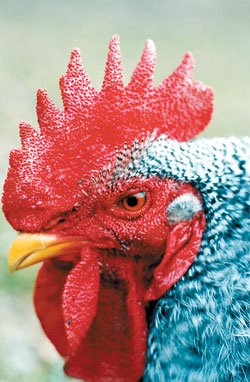 “It’s so beautiful, just like Scotland!” I often recall this comment, made by a fellow teacher on my first trip to
“It’s so beautiful, just like Scotland!” I often recall this comment, made by a fellow teacher on my first trip to I tried to make the best of it. I realized that to salvage what rainforest experience I could, I would have to take every available opportunity to explore whatever remnants of forest I could find. My hope was that if I saw enough and got lucky, maybe the sights could blend together over time into the rainforest experience I had hoped for.
I did see a big tree! It was a Ceiba tree, roughly eight-feet wide at mid-height, with buttress roots towering twice my height above the forest floor and expanding easily to a circumference of 80 feet at its base. It was four-hundred-years old, with a spreading canopy covered by orchids, bromeliads, and hanging vines. I remember the tree well because to enjoy it I had to really focus on it. You see, it was on a nature trail with open fields 100 yards away. I also had to put my fingers in my ears. Otherwise I could hear the sound of workers hammering in the distance. I tried to imagine (with limited success) hundreds of trees like this, scattered through a humid rainforest, lush and beckoning.
A few hundred miles away on another nature trail, I came upon a group of white-collared manakins. These birds, roughly robin-sized but stubbier, with bright yellow breasts and white throats, treated me to a mating display that I won’t forget. Each male uses its wings to sweep clear for himself a circular patch of the forest floor roughly three feet across. A dozen or so males may set up these neatly manicured territories in an area about one-half acre in size. When a female comes along, the males immediately respond by hopping up on tree branches and making loud snapping noises with their wings. They actually pop some bones as you might do while cracking your knuckles. The pops are followed by whirs caused by the vigorous fluttering of their wings. The best snapper in the group gets the benefit of mating with as many as 95 percent of the females that come by. It was a thrill to get swallowed up in their snaps, crackles, and pops.
The area was also inhabited by Black Howler Monkeys, and they provided me with another memorable experience as I walked a trail with a guide and another teacher, Mark. Again, we had to try to forget the farmers’ fields that were only yards away. We put blinders on and focused on the howlers that were scattered in a narrow, but fairly well-developed forest that meandered along a winding river. As we wandered along, we unknowingly approached a Howler group high in the trees. Before seeing them, Mark confused us by calling our attention to some “rain” falling from above. Other than the darkness due to the canopy overhead, there was little to suggest that a storm was approaching. A quick look into the trees, however, clarified the matter. The “rain” was coming from the monkeys. Monkeys often do this, as well as hurling feces (yep, they did that too) when threatening invaders enter their territory. The moment was only spoiled by my jealousy of Mark; I wanted the experience of first discovery, even if it meant getting sprayed and splatted.
Another adventure took place while walking through yet another forest patch, this time with houses actually in sight. I came upon a basilisk lizard. Locals call it the Monkeylala, or the Jesus Christ lizard. This particular one, small at roughly 10 inches, was resting between me and a small stream. It gets the latter name because when chased and surrounded by water, the Jesus Christ lizard will often stand up on its hind legs, and with its long webbed toes, quickly run across the water without sinking. What a treat! I turned slowly to get a better look, but spooked him. The basilisk tore away and raced upright across the surface of the stream, toes flailing wildly, head held high in the air.
My next thrill came when I was walking alone along a botanical garden trail. Here, in a flourishing jungle, I got closest to the feeling of being in a virgin rainforest. The huge leaves that arched from the plants throughout the garden made me feel small. The effect was lessened somewhat by the fact that many of the plants were growing from pots scattered along the paths. But I found that if I kept my head up at the right angle, I couldn’t see the pots. I was walking along and looking up when a sudden rustle in the leaves above me made me jump. A vine snake was just in front of me! I was astonished at its shape. Although close to three feet in length, it was almost pencil-thin. The snake looked like one of the hundreds of vines that were tangled throughout the bush. As the snake slipped away, it held its tongue rigidly straight out, like it was stuck. What a hoot! Why would the snake do this? Possibly sticking out its tongue was a desperate attempt to make its widest and most conspicuous end look more like part of a vine. But the effect gave me a good laugh.
I started recording all of these separate experiences in my journal. I tried to appreciate each one for what it was. I never saw a scrap of virgin rainforest, but I did see mature rainforest trees, draped in vines and lush lianas. I did have 16 close encounters with tropical wildlife, and for that I was very grateful.
I hoped that, in time, if I was able to forget the roads, the fields, and the construction that always seemed to intrude, then the snapping manakins, the huge Ceiba tree, the Monkeylala lizard, the slinky vine snake, and the rude Howlers would merge in my mind to give me the rainforest experience I was after.
I was left to wonder what else there was to see, and what else won’t be seen if deforestation continues at its current pace. There are no simple solutions to this problem.
[A guest essay by Ken Kneidel, in our next book The Power of Your Pocketbook by Sally Kneidel and Sara Kate Kneidel, due out in spring of 2007. This essay is previously published in Latin Line, a publication of Charlotte Latin School]











